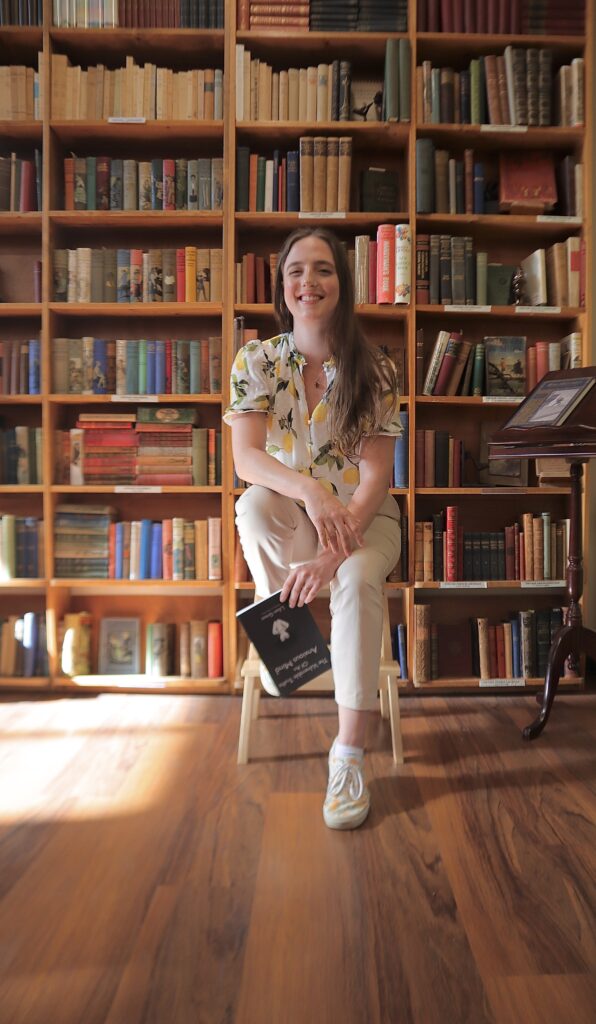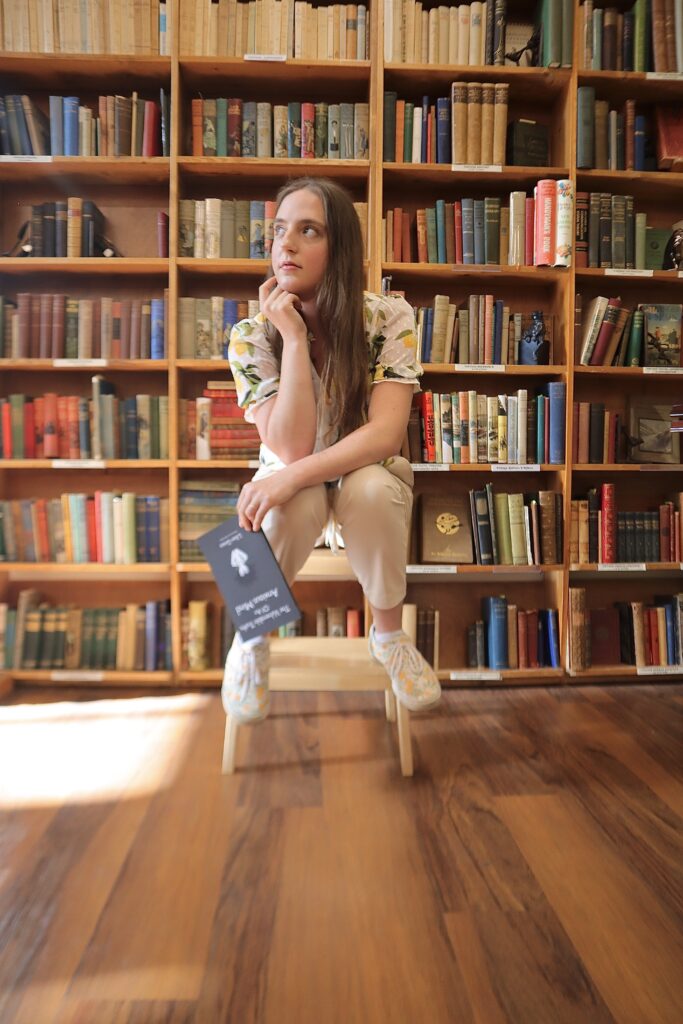In a world where vulnerability can often feel like a heavy burden, Lilian Grace stands as a beacon of resilience and creativity. At just 20 years old, she transformed her struggles with anxiety and self-doubt into powerful poetry that resonates deeply with those who share similar experiences. Lilian’s journey from aspiring author to published poet is a testament to the healing power of self-expression. Through her book, The Vulnerable Truths of An Anxious Mind, she invites readers into her emotional landscape, offering comfort and understanding. Join us as we delve into her inspiring story, exploring how poetry became a lifeline and a tool for connection in her quest for self-acceptance and healing.
1. Can you share more about the personal journey that led you to start writing poetry?
When I was 8 years old, I dreamed of becoming an author. I went back a forth on this for years, until I gave up and decided I was going to be an artist or a translator (I can speak quite well in French, so I’ve been told).
I later graduated high school and took a gap year in 2020 to become an intern at a leadership training program for young adults. This internship completely destroyed my self esteem. I was suicidal for the first time in my life and I had to leave the program. However, during my time there, I found comfort in writing poems. It started as a way to relieve the intense anxiety that I was experiencing and just be angry and sad without feeling like I needed to pretend I was okay. This is where the poems “Words Hold Silent Wounds”, “Would You Hate Me Too?” and “A Penny For Your Thoughts” were written. (They were just little snippets back then, but were later revised and expanded into the works printed in my book today.)
I can still recall once I left, thinking that these writings had genuinely helped me feel heard and honestly, they probably saved my life. I remember the thought of turning them into a book popped into my head and I just told myself, “Screw it! I’m just going to go for it!” I had put off the idea for so long, I knew it was time to finally write.
2. How did writing “The Vulnerable Truths Of An Anxious Mind” help you navigate your low points?
It was the power of self-expression that drove me to create the book in the first place. I think that the experience, in turn, helped me reflect on my past, allowing me to work towards healing, as well as give a voice to those who are still hurting. You can’t have healing without a little pain, but you can find ways to come back stronger.
3. What role does poetry play in your mental health and personal well-being?
It allows me to put into words what I haven’t been taught. And what I mean by that is we are taught the basic emotions: joy, sadness, anger, fear, disgust and surprise; but we are told they will change and that that is our “normal”. We don’t know how to respond to lasting emotions. Our emotions are usually changing, but ones like my clinical anxiety and depression have been with me since I was twelve and I’m still learning how to handle them.
Poetry allows me to express these constant emotions and look back at my writings in order to better understand myself and my mental health patterns. For example, I can see what kind of mental state I am in, based on the poetic inspiration I have that day. (Is it sad? Angry? Happy? Lovestruck? Hint: The tone of the poem is most likely influenced by my current mood.)
4. What was the most challenging part of transforming your personal experiences into poetry?

I feel like artists are both the most confident and the most anxiety-driven people you can meet.
You have to have a little confidence (or at least an illusion of it, for my socially anxious friends) in order to make it as an artist or a writer. You need to be able to sell yourself.
However, most artists that I have come across are actually quite anxious. The artistic industry has deemed, that you will most likely be unable to make a liveable career out of your works. This often leads many of us to believe that our work will never be “good enough”.
I think the most difficult part of transforming my personal experiences into poetry is not the writing process, but the self-assurance needed that the poem itself holds value. This is one of the reasons I offer a safe space for my readers to express their own experiences with mental health and other personal struggles. I think it is just as important to accept your audience, as it is to accept yourself as an author.
5. How do you handle feelings of impatience and comparison in your creative journey?
Comparison is always hard for me, because as a kid growing up with clinical anxiety, as well as undiagnosed autism and ADHD (I have been diagnosed since) I always felt like I was behind, both socially and physically.
I graduated with honours, but have always struggled with severe overthinking and social anxiety. I am also quite short, so people tend to assume I’m not very strong. This has all built up a bit of a negative self-image. Negative self-image is something that I think needs to be discussed more openly. I hope that my writing can start that conversation.
I have been recently trying to redirect my mind in times of comparison and impatience, by uplifting other poets and trying to rediscover the joy in my writing process.
Ironically, by reaching out to others and taking time to reflect, my following and readers have dramatically increased. I have also been able to realize how far I’ve come and how much I enjoy the little interactions and experiences poetry has brought me. I have gained quite a few dear friends in the process as well, which I am incredibly thankful for.
6. Can you describe a moment when you felt particularly proud of your work?
My proudest moments are when I am able to see how much my book has touched people’s lives.
During my first book signing at Indigo in Mayfair Mall, I had a woman who read a poem and then looked at me with tears in her eyes, grabbed my hand and said “Keep doing what you’re doing.” That was when I knew my book was worth writing.
7. What does vulnerability mean to you in the context of your poetry?
My approach in poetry has always been one of vulnerability.
The most moving moments of connection I have had, stem from a place of shared experience and vulnerable acceptance.
When you accept someone at a vulnerable state, you are actively choosing love over perfection.
I think vulnerability is taking those moments and allowing yourself to be ok to move at a different pace, than where the world has told you that you should be.
8. How do you hope your poetry impacts those who are struggling with anxiety or sadness?
I want to continue challenging the genre of poetry like the poets before me. My goal is to create poems dedicated to the expression of raw emotions.
With my first book “The Vulnerable Truths Of An Anxious Mind” I hope to engage my readers in a discussion of mental health, specifically anxiety.
There is something about vulnerability and sharing trauma that opens up a conversation to healing.
As long as we keep talking about it, our lives can create a sense of belonging in our flaws. If we accept our mistakes as they are, we are choosing to accept our humanity. That is what I hope to encourage.
9. What are some common misconceptions about writing poetry as a form of therapy?
People love to downplay experiences.
I have actually had the most judgment in my life when I was at my lowest.
I think some people just don’t understand anxiety, which is why I hope to give it a voice through my poetry.
I have been told many times that I should “just get over it” when expressing my anxiety. It has often been assumed that I am overreacting and that I should simply ignore it and move on. But what many don’t understand is that anxiety is more than a little fear, it is an entire mental halt where you have this paralysis in your brain that takes over everything.
Another misconception is that poetry is supposed to have structure. Poetry can be dark and chaotic; it can be a mess. I often find my inspiration, when I am in a chaotic state of mind. I will just write whatever comes up. Poetry is not always pretty and I hope to reflect that through my work.
10. How do you stay motivated and focused on your goals despite the challenges?

I have ADHD, which means if I don’t write things down as they come into my brain, nine times out of ten, I will forget them. (Sometimes I literally forget what I was thinking, as I am writing it down.) Needless to say, my Notes app on my phone is quite handy.
That being said, I rushed myself to meet my publishing date for “The Vulnerable Truths Of An Anxious Mind”, which resulted in some mediocrity. I aim to take more time with this next book, allowing myself to approach my goals at a natural pace. I have handled my goals quite hastily in the past, but with all the marketing I’ve been doing I was able to really think about what I want my brand to look like and how I approach my goals. This has been a huge help in creating poetry that is natural and true to my style and expressing my personal growth.
11. What advice would you give to other women who are facing their own struggles and considering writing as a way to cope?
I would say, just write. It doesn’t need to turn into a career, it doesn’t need to turn into a book, it doesn’t even need to be shared. Just write.
I wouldn’t be the same person if I had not scribbled away in my notebook or angrily typed out my first poem, way back in 2020. If I had done anything else, I know that I might not be standing here today.
Creating and expressing your emotions out loud or in writing is honestly so powerful. It allows you to feel an emotion and let it fully pass through your mind and body. It releases it from you when you are given the chance to fully experience it.
So don’t be afraid to write.
12. How do you balance the need for personal expression with the desire to connect with your audience?
I actually like to keep things very authentic and genuine in my writing.
There is often a lack of authenticity in the world; with AI all over the internet, it is hard to find vulnerable, real content. But that is what my poetry is, it’s raw and real, and vulnerable. It comes from genuine experiences that I am then processing and sharing with my audience in a creative form. My poetry is an example that perfection is not human. We are not made to all function the same way.
I have moments where I get caught up in the popularity contest of social media, but I choose to remind myself in those times, that I wrote to connect with people, not manipulate their attention. It has actually really improved my overall content as well, by not caring what others think and simply sharing a life that I am actively engaged in and enjoying.
13. What has been the most rewarding feedback you’ve received from your readers?
I remember a few months after I had first published “The Vulnerable Truths Of An Anxious Mind”, my Nanny (grandmother) and I were in her kitchen. She was so excited to tell me about how proud she was of me and she pulled out this notebook and said “I made notes”, then she proceeded to read what thoughts she had scribbled down in that notebook. I was so pleasantly surprised, because she had only read a few poems, but she had (literally) PAGES of notes! I think that moment will be my favourite feedback moment for a long time.
14. How do you envision the future of your creative project?
I have so many ideas I can hardly contain all of them! (Which is why I resort to my trusty Notes app.)
Firstly, I have made it my goal to keep adding more book signings into my calendar, since I have felt so encouraged and inspired by the people I have met because of them. I would not be where I am today without my support system, so I feel truly blessed that my poetry, in turn, has been a comfort and inspiration to so many people.
I hope to expand my author merchandise at some point as well. Keychains, T-shirts, water bottles, stickers, etc. I would love another excuse to get creative. Creativity is honestly why I have been so resilient in life; it’s what gets me out of bed every morning.
I am also working on another collection of poetry. I have yet to sort out all the details, but will continue writing and creating, until I have a rough idea of the vision for my next book.
All in all—in typical ADHD fashion—I have a lot of dreams in the works; which can sometimes get a little hectic, but I am excited to work towards them, until they become my reality.
15. Are there any particular poets or authors who have influenced your work and approach to writing?
I am definitely a fan of Rupi Kaur. Her empowerment of women is quite remarkable. I love the way she challenges others and even herself in order to pursue societal change. Her poetry inspires me to redefine social norms, which is what I hope to achieve when writing about mental health. I feel anxiety specifically is often misunderstood. It can often be labeled as “lazy” or “weak” or even “cowardly”, when that may not actually be the case.
Of course, who could forget the works of C.S. Lewis and Edgar Allen Poe. These two were also a huge inspiration in my writing journey.
I grew up reading a lot of C.S. Lewis both as a child and a young adult. His ability to write such powerful and quotable works is something I greatly admire. I believe most of his speeches and life statements are still applicable in today’s society.
Poe was not discovered until around my teens, but that did not stop him from heavily influencing the depth and vulnerability in my writing. His dark poetic style was one of the reasons I chose to write about mental health. I believe poetry can be written in many different tones. It doesn’t need to be lighthearted to be encouraging and inspiring.
Lastly, I enjoy poetry by Kenn J. whose poetry is as visually pleasing (as seen on her Instagram account), as it is rich in metaphors and clever stanzas. Her ability to capture creativity and bend it into something literarily breathtaking has always made me smile. I definitely have her to thank, for both our lovely conversations and my passion for literary experimentation.
IG: @lilian_of_the_valley
Website: liliangracepoetry.ca
Facebook: Lilian Grace






